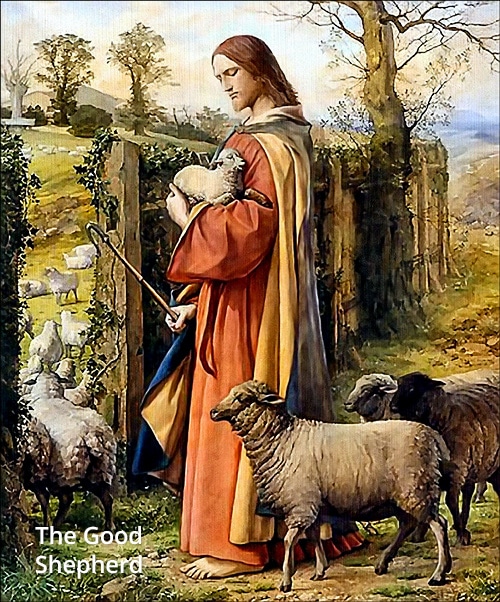
One of the disadvantages of living in a very large city is that many city dwellers do not know what is involved in growing vegetables, grains, fruits, or raising chickens, cattle, pigs, and other animals. They have never worked in the fields picking strawberries, tomatoes, or other produce. They have not picked apples or cherries from trees or blackberries from vines intertwined with poison ivy plants. They have never collected eggs from chickens and tested the eggs for blood, and they do not know how to identify double and triple yoke eggs from single yoke eggs. They have never killed a chicken, a rabbit, or a lamb for food. In fact, some people are aghast at such a thought and become vegetarians. Some people think that milk comes from a grocery store and not from a cow or a goat.
I remember working at an egg ranch as a boy, and my job was to set aside single yoke eggs to be sold at a store. Our family ate the double and triple yoke eggs. They were better than eggs from a grocery store. Why did we start this study talking about farming and ranching? The answer is that Jesus will use an illustration of a shepherd and a flock of sheep. Anyone who has spent time with sheep knows that sheep learn the voice of the shepherd and follow him. The sheep know the shepherd. Our study is from John 10:1-21.
Jesus’ Symbolic Illustration
In the previous study, Jesus warned the Pharisees that they did not have spiritual eyesight. They believed that they were the authorities in everything spiritual. In truth, they were headed for hell because they had failed to accurately understand the Scripture and respond to the truth taught by Christ. These false spiritual leaders were a danger to the Jewish people who highly respected them. They were like wolves among the sheep. This appears to be the reason that Christ gave the following symbolic illustration. Even if that is not the reason, the illustration applies to the Pharisees and Sadducees.
Truly, truly, I say to you, he who does not enter by the door into the fold of the sheep, but climbs up some other way, he is a thief and a robber. But he who enters by the door is a shepherd of the sheep. To him the doorkeeper opens, and the sheep hear his voice, and he calls his own sheep by name and leads them out. When he puts forth all his own, he goes ahead of them, and the sheep follow him because they know his voice. A stranger they simply will not follow, but will flee from him, because they do not know the voice of strangers. John 10:1-5 (NASB)
We are not used to the meaning of the word “truly,” nor are we used to seeing the word at the beginning of a sentence. The word “truly” comes from the Greek word amen which means “it is true,” “truly indeed,” or “faithfully.” Jesus used the word to declare that He was making a true statement. Today someone might say, “I swear . . .” to make the point that they are making a true statement. Jesus said, “Amen” and said it two times to emphasize that the following statement was really true.
What followed was a figure of speech (v. 6) about a shepherd and sheep. Jesus gave the crowd this illustration and then explained it. In His illustration Jesus refers to a sheepfold. A sheepfold had a door. His figure of speech assumes the sheep are inside and the door is closed. There are only two ways to get to the sheep once they are inside. Either one climbs over the surrounding wall or enters by the gate.
The figure of speech paints the picture that a thief does not use the gate to get to the sheep but the shepherd does. Christ paints an intimate picture where the shepherd knows each individual lamb by name, and the sheep know the voice of the shepherd and follow him. But they do not know the thief. The sheep follow the shepherd, but they run from the thief because he is a stranger.
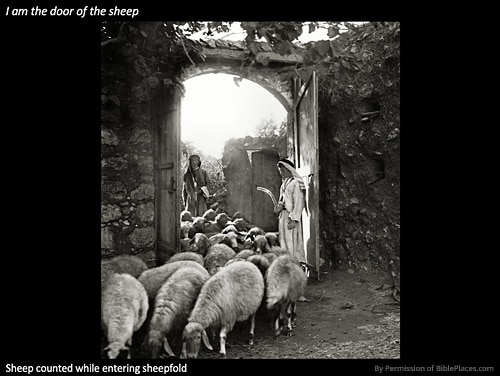
Explanation of the Figure of Speech
Now did you understand the meaning of His figure of speech? If you did not understand His message, do not feel discouraged. Notice in the next verse that we are told those with Christ did not understand either.
This figure of speech Jesus spoke to them, but they did not understand what those things were which He had been saying to them. John 10:6 (NASB)
Therefore, He started explaining the figure of speech. In the following explanation, Jesus will define four symbols: the door (v. 7), the thief (v. 8), the shepherd (v. 11), and the sheep (v. 16-18). In verses 12-13 He will compare Himself to a hired hand. Then in verses 14-18 He will reveal why He is called the good shepherd. In the final verses we will see the reaction of the crowd to His figure of speech (v. 19-21).
So Jesus said to them again, “Truly, truly, I say to you, I am the door of the sheep.” John 10:7 (NASB)
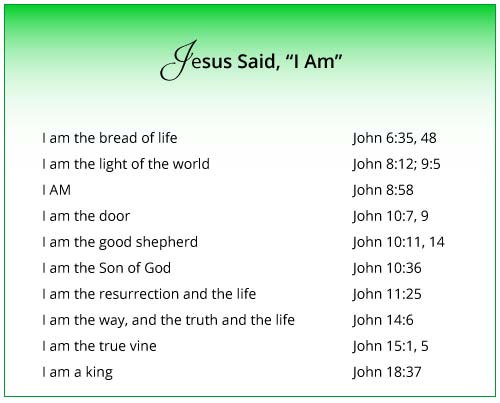
Jesus is the Door to Eternal Life
The word “again” in verse 7 should not be understood to simply imply that Jesus is just repeating Himself. The word “again” refers to the phrase “Truly, truly.” Once again He is declaring truth and this time the truth is that He is the door to the sheepfold. The Greek word for door can also mean “gate” since the Greek word thura can refer to any entrance into a building or closed area. So Jesus is the gate or the door to the sheepfold. That is the first symbol He defines in the figure of speech.
Obviously, a gate or door to the sheepfold has two purposes. The first purpose of the door is to open and permit only the sheep into the sheepfold. The only way sheep can get into the sheepfold is through the door or Christ. The Greek grammar tells us that Jesus spoke emphatically when He said that “I am the door.” “I” and not someone else was His message. He is the only way into the sheepfold which is symbolic of eternal life.
In the next verse Christ strengthens His message.
All who came before Me are thieves and robbers, but the sheep did not hear them. John 10:8 (NASB)
Everyone else is not the door but are thieves and robbers. They pretend to care for the sheep, but they only want something at the expense of the sheep. Jesus uses two different Greek words for thieves and robbers. The Greek word for “thieves” is kleptes from which we get the English word kleptomaniac and the abbreviation klepto. The thief just lifts or takes something that belongs to another person. It is done secretly.
The Greek word for robber is lestes, which refers to one who steals and causes injury in the process. This is the person who enters a home to steal and in the process causes bodily injury. Both words are used figuratively of the false teachers.
Then Jesus reveals that He is the door to salvation.
I am the door; if anyone enters through Me, he will be saved . . . John 10:9a (NASB)
In verse 8 Jesus had said that “all” who came before Him were thieves and robbers. That included all false teachers, including the Pharisees and Sadducees. Notice that Jesus did not say that He was one of several doors or many doors. He never taught that He was one of many different ways to heaven. Acts 4:12 says that there is no other way into heaven, except through Jesus Christ.
And there is salvation in no one else; for there is no other name under heaven that has been given among men by which we must be saved. Acts 4:12 (NASB)
Those who teach that there are many doors to eternal life are thieves and robbers since they have self-centered motives.
But Jesus’ message is that forgiveness of our sins and eternal life can only be found in Him. Everyone else who claims to have the keys to spiritual life is a liar. Jesus declared that He is the door to salvation. Those who repent of their sins (Luke 13:3) and believe in Jesus Christ for the forgiveness of their sins will be saved. Anyone else will send the trusting soul to hell. Why? John 3:18 says that He is our only choice! There is no middle ground with Christ.
He who believes in Him is not judged; he who does not believe has been judged already, because he has not believed in the name of the only begotten Son of God. John 3:18 (NASB)
Jesus is the Door – To Eternal Security
The second purpose of the gate or door is to keep the sheep safe. Now notice in verse 9 that Jesus said, “He will be saved.” He did not say he might be saved if he performs good works. Jesus did not add conditions to the promise. His statement is a simple promise. Salvation is found in Him and they will be saved. Why? Because they are trusting Christ to care for them. A good shepherd will do everything for the sheep. That is the message of the last part of verses 9-10.
I am the door; if anyone enters through Me, he will be saved and will go in and out and find pasture. The thief comes only to steal and kill and destroy; I came that they may have life, and have it abundantly. John 10:9-10 (NASB)
Christ describes eternal life from the sheep’s perspective. Sheep will enjoy the lush, green pasture. As a result, Jesus describes their future life as abundant life. Ephesians 1:3 promises Christians that they will receive “every spiritual blessing in the heavenly places in Christ.” The abundant life for a Christian starts at the moment of saving faith and continues into eternity. Eternal life does not start at death.
Everyone else who claims to offer spiritual blessings are liars. Jesus calls them thieves and robbers. False teachers have self-centered motives. They offer a man-centered approach to salvation. How many people attend a church that does not reveal if the pastor is a faithful and true teacher or a false teacher? Even the New York Yankees can fill a baseball stadium, but I would not go to a game to discover how to be saved and gain eternal life. The false teacher is motivated by pride and greed and does not care for the sheep. He deceives with elegant church facilities, wonderful music and large crowds.
“The Good” Shepherd Lays Down His Life
Next, Jesus twice declared that He was the good shepherd. The first time He said that He was the good shepherd was because He was going to lay down His life for the sheep (John 10:11-13). The second reason He was the good shepherd was because He knew His own sheep and they knew Him (John 10:14-16). Here is His first comment.
I am the good shepherd; the good shepherd lays down His life for the sheep. John 10:11 (NASB)
There are two nuggets of spiritual gold to be discovered in the Greek text that helps us understand what Jesus said. These nuggets of gold make His comments come alive. The first one is that the Greek once again reveals Jesus made an emphatic statement when He said, “I am.” The Greek phrase that He used was ego eimi, which literally means “I I am.” That is, He emphasized that He and He alone is the good shepherd. No one else qualifies.
The second gold nugget is the Greek word for “good.” There are two basic Greek words translated as “good.” The first word is agathos which has the sense of external goodness in one’s conduct, such as an ethical standard. The second Greek word, kalos, originally had the meaning of beauty, but the word eventually included the meaning of agathos. Therefore, kalos included agathos.[1] Kalos is the word that Jesus used. This means that when Jesus said, “I am the good shepherd,” He emphatically declared that He and no one else was “the good” person in conduct. He is the shepherd with an impeccable character of beauty. No one else has higher character and His external behavior proved it.
In order to help us understand Jesus’ comment, think about some person you know. Are they morally good? Has their conduct always been perfect? How about yourself? Is your moral character perfect? Have you ever sinned? In sharp contrast, Jesus has never sinned. He is holy and His character proved it. Jesus was and is “the good” shepherd! No one else qualifies. That is why He laid down His life for the sheep. As He taught, healed and performed signs and wonders, He knew the Pharisees increasingly desired to murder Him. That is, He was in the process of preparing to die and would eventually be vicariously sacrificed on the cross for the sins of the world.
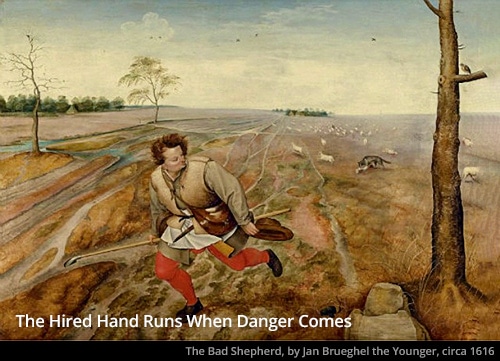
But anyone else is not willing to die for the sheep. The Pharisees and Sadducees claimed to be the true shepherds, but they were not willing to die for the sheep. In verses 11-12, He calls false religious leaders and everyone else who is like them hired hands.
He who is a hired hand, and not a shepherd, who is not the owner of the sheep, sees the wolf coming, and leaves the sheep and flees, and the wolf snatches them and scatters them. He flees because he is a hired hand and is not concerned about the sheep. John 10:12-13 (NASB)
A hired hand was a person hired to care for the sheep. Since he did not own the sheep, the hired hand did not truly care for them. The proof that a hired hand is a hired hand is revealed by his behavior. When danger comes he will protect himself. He will run!
If you are a pastor of a church, does your behavior reveal that you are a good shepherd or a hired hand? Do you shepherd the sheep or is the ministry a job? Is it a forty-hour week and that is it? Would you love to shepherd the sheep if you were not paid or is your salary what motivates you to “go to work”?
“The Good” Shepherd Knows The Sheep
The next time Jesus said He was the “good shepherd” was in verses 14-16. This time He reveals that He knows everyone in His flock.
I am the good shepherd, and I know My own and My own know Me, even as the Father knows Me and I know the Father; and I lay down My life for the sheep. John 10:14-15 (NASB)
This is a comforting statement. If you are a Christian, Jesus said that He knows you. Jesus’ statement is all inclusive. He knows which sheep are His. Earlier in Matthew 7:21-23, Jesus warns those who think they are Christians or sheep but are not, that at the judgment He will declare, “I never knew you.” When Jesus says that He knows “My own,” we should understand “know” to mean more than knowledge. It also includes love, as a father loves his son. That is the message of John 3:16.
For God so loved the world, that He gave His only begotten Son, that whoever believes in Him shall not perish, but have eternal life. John 3:16 (NASB)
In Ephesians 1:4-5 we are told that God has chosen or predestined men and women to become Christians. In that passage God mixes the concept of knowledge and love together. To chose in advance or predestine involves knowledge and love (Ephesians 1:4). Because God loves us, every Christian has been adopted as family members.
Not only does Christ know and love His sheep, but they will also know and love Him in return. That message is scattered all over Scripture. Maybe the clearest passage about loving Christ is 1 Corinthians 16:22 where we are told that anyone who does not love Christ is to be cursed or sent to hell. Usually the Greek word for love in the New Testament is agape. But in this verse the Greek word is phileo which refers to friendship love, an emotional love. That is, a true Christian will eventually have an emotional love for Christ. We will love because He first loved us (Romans 5:5; 1 John 4:19).
In 1 John 2:12-14 we discover that the mark of a mature Christian is one who knows God deeply. In verse 14 Jesus describes the true relationship that every Christian has with Christ. It is a deep and growing relationship. He loves His sheep and they love Him in return. The ultimate proof of His love for them is that He died for the sheep.
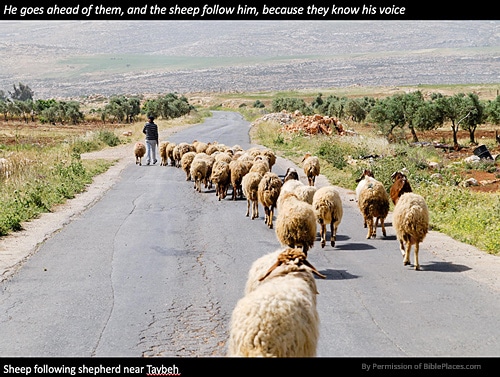
“The Good” Shepherd Has Other Sheep
Jesus’ next statement is wonderful.
I have other sheep, which are not of this fold; I must bring them also, and they will hear My voice; and they will become one flock with one shepherd. John 10:16 (NASB)
When He said that He has “other sheep,” He referred to non-Jews or Gentiles. It is important to know that the Greek word that is translated as “other” is allos. Since there are two different Greek words that translate as “other,” it is important to know that allos refers to “other of the same kind.” Another Greek word, heteros, means “other of a different kind.” This means that even though there would be Gentile Christians, they would not become Christians and have an inferior or superior status among Christians. All Christians are adopted into God’s family as equal family members (Galatians 3:28).
Now the question someone may ask is did the prophets of the Old Testament prophesy that salvation would be offered to the Gentiles? Isaiah 49:6 answers the question.
It is too light a thing that you should be my servant to raise up the tribes of Jacob and to bring back the preserved of Israel; I will make you as a light for the nations, that my salvation may reach to the end of the earth. Isaiah 49:6 (NASB)
The answer is that salvation would be offered to everyone on the earth. In Matthew 28:19-20; Luke 24:45-47 and in Acts 1:8, Jesus commanded the apostles to preach the good news about Jesus Christ to all the nations of the world beginning in Jerusalem. Romans 1:16 and Romans 9:24-29 also reveal that Christ had “other sheep” and they are the Gentiles. Therefore, the body of Christ, the church, would be composed of Jews and Gentiles.
Jesus also revealed that they would hear His voice and follow Him. Therefore, the church would be one church and not a divided church: one for Jews and another for Gentiles. It is sad today to see messianic ministries that are designed for Hebrew Christians and to discover that they believe there is efficacy in the Mosaic ceremonial law. As a result, they separate themselves from Gentile Christians. Christ never planned for Jews and Gentiles to have separate churches. Notice that Jesus said that He would have one flock and they would have one shepherd. The Greek word for one is heis and it refers to the cardinal number one or the digit one. Even if the churches are separated, they still have only one true shepherd.
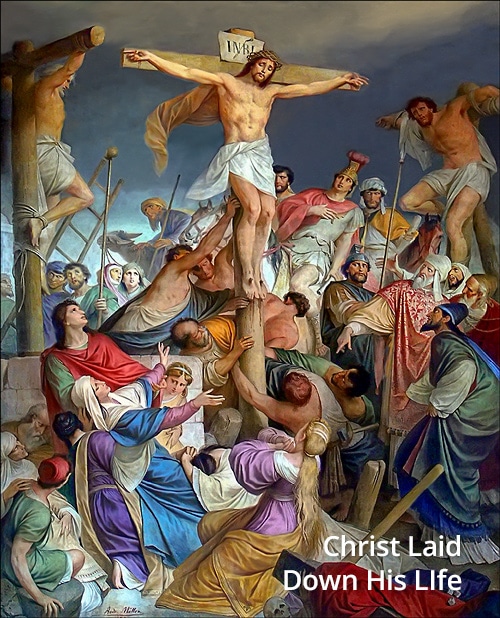
“The Good” Shepherd Lays Downs His Life
Then Jesus told the disciples the Good Shepherd will lay down His life for the sheep.
For this reason the Father loves Me, because I lay down My life so that I may take it again. John 10:17 (NASB)
This verse is packed with so many spiritual jewels. First, we are given an inside peek into the inside relationship of the Trinity once again when we are told the Father loves Christ. Earlier in John 3:35 and John 5:20 Jesus said that the Father loved Him.
Later in John 15:9 He will repeat it again. One might wonder if Christ loves the Father or is the relationship just one of submission? John 14:31 gives us the answer when it reveals that Christ loves the Father. These powerful statements teach us that the Trinity does not have a sterile, cold relationship. Instead, love exists within the Trinity. This is very meaningful to anyone who wonders if God is a God of love. Not only does 1 John 4:8 teach us that God is love, but now we know that there is warmth within the Trinity. When Christ died on the cross, He showed us that the Trinity loved us too! Did you catch the significance of Jesus’ statement that the Father loved Him because He laid down His life for us? This reveals that God the Father wanted Christ to die for us. God is an incredible example of unselfish love.
The second spiritual jewel is that Christ said He would lay down His life and then raise Himself back to life.
No one has taken it away from Me, but I lay it down on My own initiative. I have authority to lay it down, and I have authority to take it up again. This commandment I received from My Father. John 10:18 (NASB)
Once again Jesus uses the emphatic “I.” That is, He will lay down His life and no one else will be in control of His death and resurrection. Now since when is any human in control of how or when he or she dies and then is able to raise their body back to life? Once again the deity of Christ is revealed. This is a big jewel.
Just as the Trinity was involved in the Creation (Genesis 1:2; 1 Corinthians 8:6; Colossians 1:16-17; Hebrews 1:10-12), so the Trinity was involved in Christ’s death and resurrection. The Father planned it (Acts 2:22-24) and Christ executed the plan with the Holy Spirit’s help (Hebrews 9:14; 1 Peter 3:18). Christ’s message was that the Pharisees, Sadducees and Romans could crucify Him on a cross, but they would only be able to do what He had planned.
In Hebrews 10:9 we find an amazing passage that reveals Christ’ willingness to die for our sins. The author of Hebrews reveals that Christ fulfills Psalm 40:8 which reveals that Christ willingly came to do the Father’s will. Throughout Christ’s ministry He stated thirty-four times that the Father had sent Him (John 1:33; 4:34; 5:24, 30, 36-37; 6:38-57; 7:16, 28-33; 8:16-18; 26, 29, 42; 9:4; 11:42; 12:44-49; 13:20; 14:24; 15:21; 16:5; 17:8, 18-25; 20:21). This time in John 10, Jesus reveals that He willingly came to die for the sheep.
All of this proves that Jesus is the Good Shepherd. He had the authority, exsouia, the power and the privilege to do as He wanted with His body. God the Father, the master planner within the Trinity, gave Him that authority. The plan was to die for the sheep, and He wanted to die for the sheep. Thieves, robbers and hired hands would not do that. This study is about a love relationship between God and His sheep.
The False Shepherds Miss The Message
In sharp reaction, the Jewish religious leaders concluded that Jesus was crazy, but disagreed among themselves because of His great and extraordinary miracles.
A division occurred again among the Jews because of these words. Many of them were saying, “He has a demon and is insane. Why do you listen to Him?” Others were saying, “These are not the sayings of one demon-possessed. A demon cannot open the eyes of the blind, can he?” John 10:19-21 (NASB)
The Greek word that is translated as “division” is schisma, from which we get the English word schism. This word gives us insight to what actually happened. The word “division” is too soft and mild since schisma implies a schism within the religious leaders themselves. Earlier in John 8:31 we were told that some of the religious leaders were believing in Him. Now we discover from John 9:16 that the reason for the disagreement about Christ at the time the man born blind was healed was because some of the religious leaders were believing in Christ. But they were the minority.
In John 3:1 and verse 10 we were told that Nicodemus was a ruler of the Jewish leaders and teaching Judaism. In John 7:50-51, Nicodemus tried to defend Christ. Later we will be told that he came to help bury Christ (John 19:39). In John 12:42 we will discover that some of the rulers believed in Him. Therefore, this schism must have been severe. A majority of the religious leaders rejected Christ but a minority believed in Him.
The majority thought Christ was demon possessed and insane. They had accused Christ of being demon possessed three different times before (Matthew 9:27-34; Matthew 12:22-32; Luke 11:14-23). This time the “thieves, robbers and hired hands” did not accuse Him directly to His face but privately. Most likely the minority recognized that they were part of Christ’s flock. They had heard His voice and they were beginning to follow.
Notice the confrontational language. “Why do you listen to Him?” the “hired hands” demanded to know. But those who believed in Christ were asked, “These are not the sayings of one demon-possessed. A demon cannot open the eyes of the blind, can he?” The schism was present.
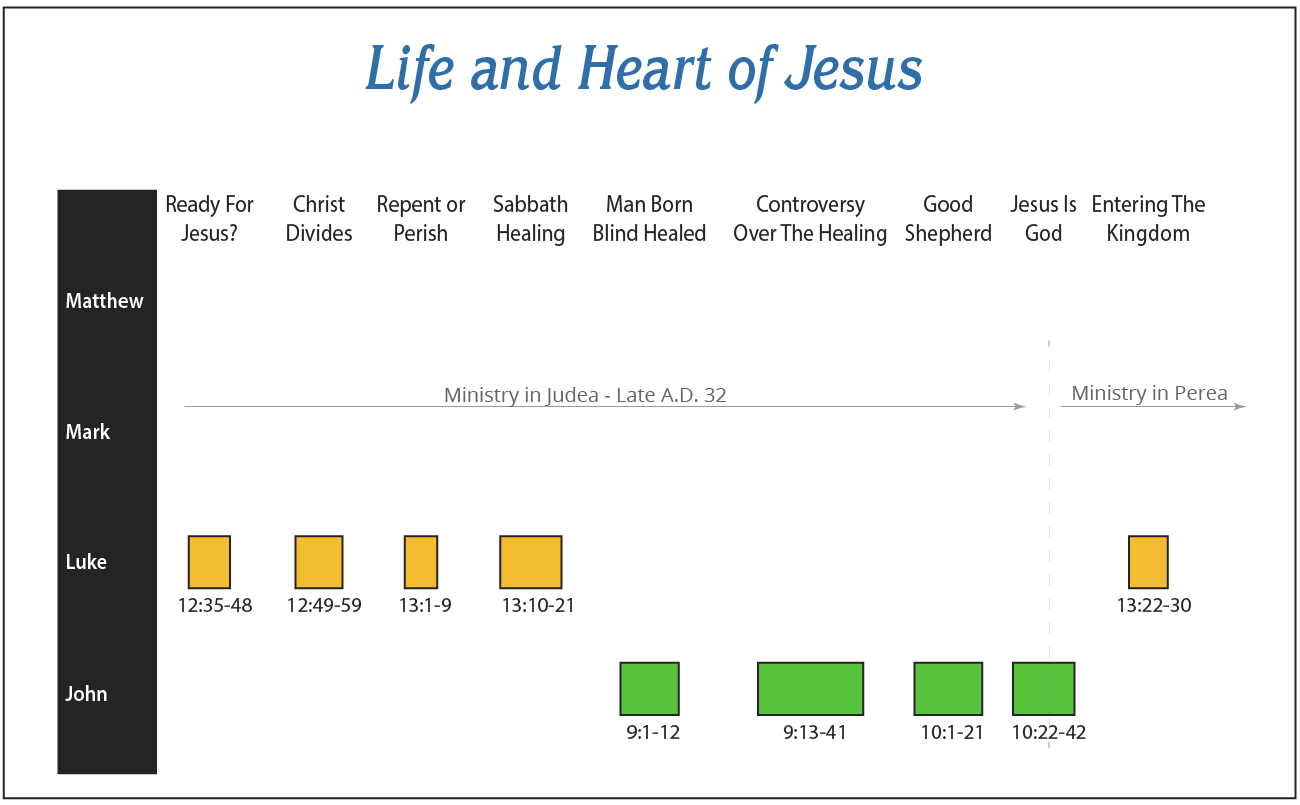
Conclusion
Of which group are you? Do you think that Jesus is insane? Do you deny that Jesus did miracles? It is amazing that both the gospels and Jewish historical records do not claim that Jesus did not do miracles, signs, or wonders. Instead, they offer an explanation as to how He did the miracles, signs or wonders. When the critics try to explain how Jesus did them, that reveals He did them! They did not deny He did them; they offered an explanation. They said He was demon possessed.
The minority asked the right question. A demon possessed person does not speak as Jesus did. Nor can a demon open the eyes of the blind. This last comment reveals that Jesus teaching about the good shepherd immediately followed the healing of the man born blind.
Jesus’ teaching reveals that the true sheep will and do follow Christ. He died for them because He came to do the Father’s will and it was His choice (John 10:11, 17-18). He is the door to eternal life. Those who believe and accept Christ as their Savior and Lord belong to the flock and are in the sheepfold. The safe sheepfold symbolizes eternal life. Christ is the shepherd who guards those who have eternal life. Do you have eternal life? Is Christ your shepherd? He is your good shepherd if you are repentant of your sins, want Him to forgive your sins, and are willing to submit to Him as your Savior and Lord.
If you are a pastor or teacher, you are an under-shepherd. Jesus is the Good Shepherd. Here Jesus teaches us that the pastoral ministry is not about personal gain but about denial of oneself. It is willingness to obey God the Father, as Christ did. It is a willingness to deny self and if necessary lay down your life for the sheep.
Greater love has no one than this, that one lay down his life for his friends. John 15:13 (NASB)
References:
1. Colin Brown. The New International Dictionary of the New Testament. Regency Reference Library 1971. vol. 2. p. 102.
Questions or Comments?
Suggested Links:
The Symptoms of Spiritual BlindnessWhat is the meaning of John 10:1-6?
Where is Jesus’ other fold?